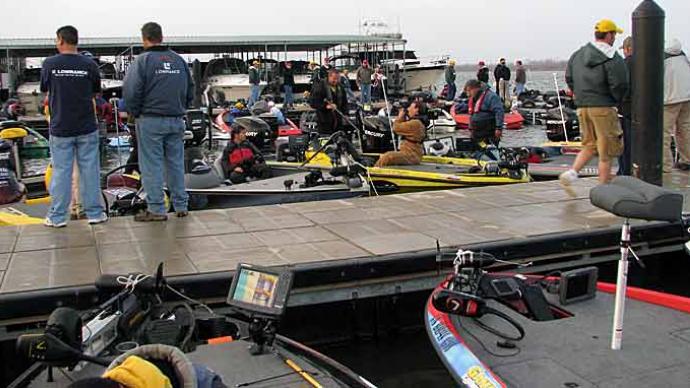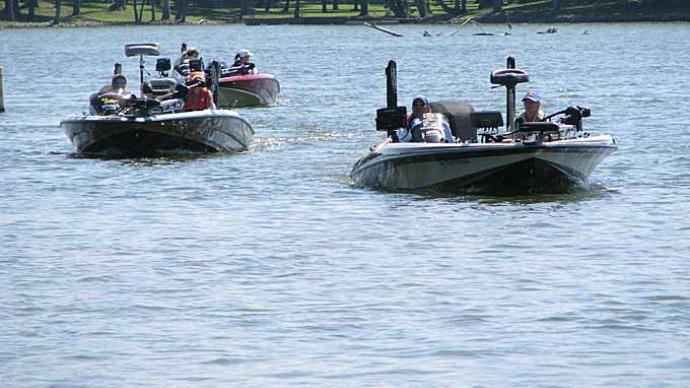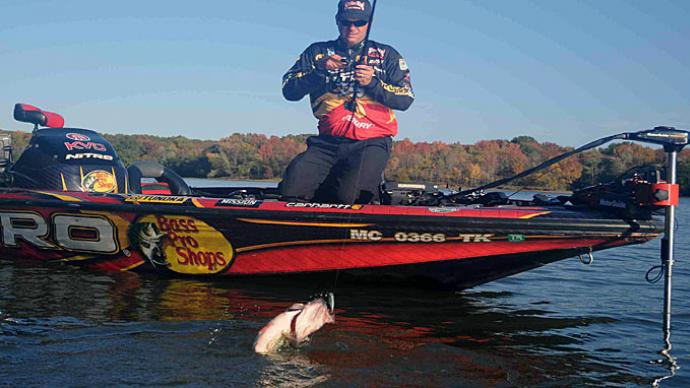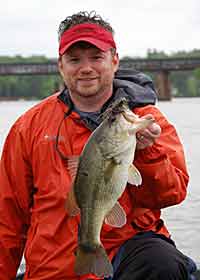
Memories are a great byproduct of fishing. Luckily, the majority of them are good. Enjoying a perfect sunrise or sunset, meeting friends who pass the test of time and big fish are just some that I recount again and again. Other memories bring a chuckle, but maybe not at the moment, such as forgetting the drain plug or falling overboard at a tournament as your bass club buddies watch. Every angler has some memories that aren't fond, no matter how they are framed. These include lost bass, awful boat rides, and uncomfortable situations. As much as you want to bury them, you shouldn’t. They can help you become a better tournament angler.
Reliving the could-haves and should-haves won’t change the past, but it can prepare you for the future. The key to dealing with wrong turns in life is culling the lessons that will keep you headed in the right direction. So here are lessons I learned, which I still use today every time I launch my boat. Take them to heart and turn my pain into your prosperity.
Switching seats
It was the start of the season, my 10th as a co-angler, or, as we called ourselves, nonboaters. My first tournament was on the Potomac River. At the partner draw, I convinced my boater that it was worth running to Port Tobacco Creek, which is on the Maryland side, way down from the launch we used at Leesylvania State Park in Virginia. I had found a school of bass in an expansive weedbed there while practicing with another angler and, with his blessing, wanted to fish it during the tournament. My boater agreed, for whatever reason, and that’s where we headed when our boat number was called the following day.
As you run farther downstream from Leesylvania, the river widens and welcomes the opportunity for big winds to push big waves. That was the situation we faced this day, and we stuffed numerous waves on the way down. The highlight from the return run was the cushion on the front pro seat coming to lose and heading right for my face. I was able to dodge it. I never felt in danger, just very uncomfortable. That wasn’t only because of the conditions but also because he made the run based on what I had found. It was a risky move, and, probably in his mind, the few fish we did catch before moving to his spots meant it wasn’t worth it. Before we reached check-in that afternoon, I knew I needed to move to the boater side, especially if I was going to push for longer runs and fish for bass that I found in practice.
Does every tournament angler have to become a boater eventually? Not because co-anglers are an essential part of tournament fishing. It’s a great way to learn, and it takes a different skill set to be successful from the back deck. It can be nice not to think about boat payments, and you get to fish with different anglers, opening doors to learning many new techniques.
But for some anglers, there will come a time when they are ready to sit behind the steering wheel. That was a big lesson for me. I don’t regret the move. It also was a lesson in expecting and embracing change. I knew I wanted to be a boater but never gave much planning to it. But this tournament was the needed catalyst. It wasn’t a couple of weeks later that my new-to-me bass boat was sitting in the driveway.
Believe in your abilities.
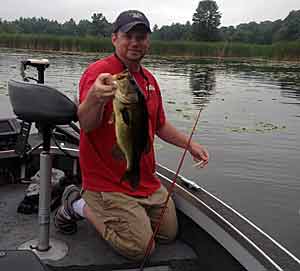
When you’re without a boat in a draw-format tournament, it cannot be easy to convince boaters to fish what you find. That was the case at a tournament on the St. Lawrence River, back before it was pumping out 4- to 6-pound smallies, such as the Bassmaster Elite Series anglers caught there last year. I had practiced out of my small aluminum boat. If I kept an eye on the wind, I could make my way around the large body of water. The day before the tournament, I found a group of islands on the Canadian side surrounded by 3- to 4-pound largemouth. I caught them fishing a jig through milfoil anywhere large chunks of granite were mixed. These were winning bass.
At the partner draw that evening, my name was the last to be drawn. The boater I was paired with turned out to be a friend who had much success on this body of water. He had found a school of smallmouths upstream in Lake Ontario. He promised we could go there and catch them on spinnerbaits and jerkbaits. What we couldn’t do was fish both of our spots. With an hour run to either one from the launch in Clayton, N.Y., each was the commitment for the day. There was no changing midstream. Knowing that, I mentioned what I found but didn’t push for us to fish for the largemouth.
The following day, the boat arced to the west and the lake once we cleared the marina. He had five chunky smallmouths in the boat, and I had just one when we left his main spot. We let them go when, halfway back, we broke down and called for the trailer from a small marina. The mechanical issue was out of our control. It would have happened if we ran to the largemouth spot. But still, you always wonder what might have been. Future tournaments shined some insight. The pattern I developed that day helped me win a couple of tournaments and place high in others. I even won big-fish twice with largemouth weighing 6-10 and 6-06.
This situation is close to extinction as more tournaments move to boater and co-angler divisions, where the boater controls the entire day. But it still applies to team tournaments, when each practices from his boat. So don’t be so quick to give up on what you found. Work together, weighing your options, so you both do well.
Fish hard every day
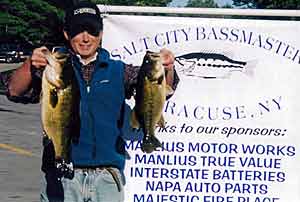
The July weather was uncomfortably hot for this latitude. I had just finished a long week at work that wore me out and then rushed through the two-hour drive to the St. Lawrence River, where I had a tournament the following week. I didn’t sleep well that night. I put the boat in Saturday morning and ran my regular spots. No bass were home. I tried some new places without success. As the temperature was rising, my interest was waning. It was utterly spent by the end of the day. So instead of powering through the next day, I went home.
That lack of effort showed a week later when my buddies stuck around and kept practicing, did well in the tournament, and I finished way down in the standings. It was a long drive home after the tournament, wishing I could get that practice day back until I parked in the driveway. But I remembered that feeling, and it helped me later in the season.
My last tournament of the season was slated for Oneida Lake near Syracuse, N.Y. On my one day of practice, I started at the east end of the lake and fished my way to the west end, arriving there just as the sun was setting. With my flipping stick in hand and a jig tied to the end of my 20-pound test line, I dissected a thick bed of milfoil, uncovering enough bass to lead me to a second-place finish the following weekend. Until then, I hadn’t had much success, just a bass here and there. If I quit, as I did six weeks earlier, I would have never found those bass. You must commit to fish as hard on practice days as on tournament days. You’ll see the payoff in the final standings, but you might have to put in a little more time -- waiting for your prize check.
Be gear aware
I’d always thought of line in ranges – anything less than 10-pound test on spinning reels and more than that on casting reels. At a recent tournament on Lake Wateree, which is a short ride from Columbia, S.C., I caught some bass on a buzzbait in practice, but they cooled off by tournament time, and I was forced to pitch wacky rigged worms under docks, dead sticking them until a bass decided to eat it. I was generating bites, which I converted. The problem came at the boat. I broke off three bass in a row, all at the net. The 6-pound test leader I was using, probably nicked from the docks, was snapping as soon as it came in touch with the net. That cost me a check.
The water was stained, so I could have used a stronger leader without it being noticed by the bass. But I was rigged with a line that I thought would work. With the shade under the docks and stained water, I should have upped my leader to 8-, 10- or even 12-pound test. Or maybe I should have tied the braid directly to my lure. The lesson here is that you need to take the time to control every variable you can, especially in a tournament, when every ounce counts only once it’s in the boat. And that lesson isn’t just for your line choice. Would a longer rod generate longer casts and keep you farther from spooky bass? Would a faster reel mean more hook-ups with smallies that crash your tube jig and shoot for the surface? Would a heavier jig penetrate the cover better, reaching largies hiding from the first big cold front of the fall? Maybe it’s worth a try. The only thing you have to lose is bass.
Knowing when it’s break time
I was the first one at the ramp. That’s my preferred arrival time: no waiting in lines, pick of the prime parking spots, and some quiet time on the lake to put the final touches on the day’s plan. That’s how the day started at a tournament last spring. The only thing, once my boat was in the water, I was ready to put it back on the trailer.
It takes a lot of time, dedication, willpower, and resources to fish tournaments, regardless of the level. And those expenditures can take a toll on you and your loved ones. Your confidence can be the biggest casualty of tough tournaments during a stretch or a season. The fun follows your confidence. You’re having the time of your life when you are catching bass. The long drives seem short, the boat rides not as rough, and the soggy peanut butter and jelly sandwiches in the cooler tastier. When bass are harder to come by, that all changes. It takes more effort to get to the lake, and once there, your decisions aren’t sharp, and your mind wanders, often back to what is happening off the water. When that happens, it might be time to find out.
There’s no disgrace in stepping aside from tournaments and catching your breath. They will be there when you are ready to return. And a break can be just what you need to restock your inner tackle box and get back on top of your game. And not fishing tournaments doesn’t mean you have to stop fishing. That’s what’s great about this sport. There are so many ways to enjoy it. You can take the time to explore bodies of water you’ve always wanted to fish, learn new techniques or chase different species. I’m still fishing for bass while under a self-imposed sabbatical, even entering a small tournament once in a while. But I also have started musky fishing, something I’ve always wanted to do but never had the time it needs to be successful.
These adventures rekindle my fire for competitive fishing and make me a better angler. Without the pressure of having to find fish, I’m open to trying new spots and techniques. That’s generating more confidence and adding experience I can draw from down the road. The spark for the competition is growing again, and I’m sure I’ll be at a blastoff sooner than later. Wherever and whenever that is, these five memories will be there, guiding me.


